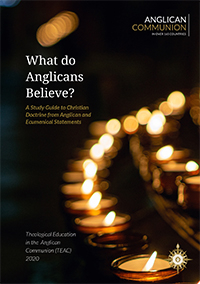What do Anglicans Believe? New study guide published by the Anglican CommunionPosted Aug 3, 2020 |
 The Anglican Communion has today published a new international study guide to help theological students around the world answer the question “What do Anglicans Believe”. The study guide is an introduction to Christian doctrine and draws on both Anglican and ecumenical statements of belief.
The Anglican Communion has today published a new international study guide to help theological students around the world answer the question “What do Anglicans Believe”. The study guide is an introduction to Christian doctrine and draws on both Anglican and ecumenical statements of belief.
The study guide introduces a number of ecumenical texts and then asks questions to help students consider the practical application of the agreements in the life of their churches; including whether or not the life of their church “demonstrates that it is of Jesus Christ and what he does”; and how churches can show this more clearly.
In addition to use in theological colleges, it is envisaged that the study guide will be used by Christians across the world in home groups and study programmes.
The Anglican Communion is a family of 41 independent but inter-dependent churches around the world which trace their roots to Saint Augustine’s mission to convert the British in AD 595 and with continuing links to the Archbishop of Canterbury. It is the third largest Christian denomination globally, after the Roman Catholic and Orthodox Churches, and is present in more than 165 countries around the world.
The study guide has been written by the Theological Education in the Anglican Communion (TEAC) team at the Anglican Communion Office in London, with three members of IASCUFO – the Inter-Anglican Standing Commission on Unity Faith and Order.
The Anglican Communion’s Director for Theological Education, the Revd Dr Stephen Spencer, explained that the study guide builds on dialogue about doctrine that Anglican Churches have had with each other, and with other churches across the world ever since they were formed, saying: “over recent decades these conversations have produced a rich and authoritative collection of agreed statements, written by Anglican theologians in partnership with theologians from other churches, to create a broad and rich map of the Christian faith as it has been received and handed on by these churches.”
Dame Mary Tanner, who previously served as both European President of the World Council of Churches and as Moderator of its Faith and Order Commission, welcomed the new study guide, describing it as “such an important guide on Christian doctrine from Anglican and ecumenical sources.”
She said: “It offers such a good, engaging way to help students and clergy become familiar with ecumenical documents in a way that is relevant for their own lives and local experiences in worship and in mission and to ensure that that work is not forgotten. And it’s use of questions to readers will draw them into the subject. It is just what the Faith and Order commission in my day would have hoped for ie. receiving the fruits of the convergence statements in changed lives and in changed, closer relations with others who could also recognise the faith of the church in the documents.”
The study guides can be downloaded free of charge in English, Spanish, French and Portuguese from anglicancommunion.org/teac.
ENDS
Note to editors
The full title and ISBN number for each edition is:
- English
What do Anglicans believe?
A Study Guide to Christian Doctrine from Anglican and Ecumenical Statements
ISBN: 978-1-913863-00-5 - Spanish
¿En qué creen los Anglicanos?
Una Guía de Estudio para la Doctrina Cristiana a partir de las Declaraciones Anglicanas y Ecuménicas
ISBN: 978-1-913863-01-2 - French
En quoi croient les Anglicans?
Un guide d’étude pour la Doctrine Chrétienne à partir de Déclarations Anglicanes et Œcuméniques
ISBN: 978-1-913863-02-9 - Portuguese
Em que os Anglicanos Acreditam?
Um Guia de Estudo para a Doutrina Cristã a partir de Declarações Anglicanas e Ecumênicas
ISBN: 978-1-913863-03-6
The 41 member churches (provinces) of the Anglican Communion are:
- The Episcopal / Anglican Province of Alexandria
- The Anglican Church in Aotearoa, New Zealand and Polynesia
- The Anglican Church of Australia
- The Church of Bangladesh
- Igreja Episcopal Anglicana do Brasil
- The Anglican Church of Burundi
- The Anglican Church of Canada
- The Church of the Province of Central Africa
- Iglesia Anglicana de la Region Central de America
- Province de L’Eglise Anglicane Du Congo
- Iglesia Anglicana de Chile
- The Church of England
- Hong Kong Sheng Kung Hui
- The Church of the Province of the Indian Ocean
- The Church of Ireland
- The Nippon Sei Ko Kai (The Anglican Communion in Japan)
- The Episcopal Church in Jerusalem & The Middle East
- The Anglican Church of Kenya
- The Anglican Church of Korea
- The Anglican Church of Melanesia
- La Iglesia Anglicana de Mexico
- The Church of the Province of Myanmar (Burma)
- The Church of Nigeria (Anglican Communion)
- The Church of North India (United)
- The Church of Pakistan (United)
- The Anglican Church of Papua New Guinea
- The Episcopal Church in the Philippines
- Eglise Anglicane du Rwanda
- The Scottish Episcopal Church
- Church of the Province of South East Asia
- The Church of South India (United)
- The Anglican Church of Southern Africa
- The Anglican Church of South America
- Province of the Episcopal Church of South Sudan
- Province of the Episcopal Church of Sudan
- The Anglican Church of Tanzania
- The Church of the Province of Uganda
- The Episcopal Church
- The Church in Wales
- The Church of the Province of West Africa
- The Church in the Province of the West Indies
In addition, there are five extra-provincial churches within the Anglican Communion, under the oversight of the Archbishop of Canterbury:
- The Church of Ceylon
- Bermuda
- The Lusitanian Church
- The Reformed Episcopal Church of Spain
- Falkland Islands

Social Menu